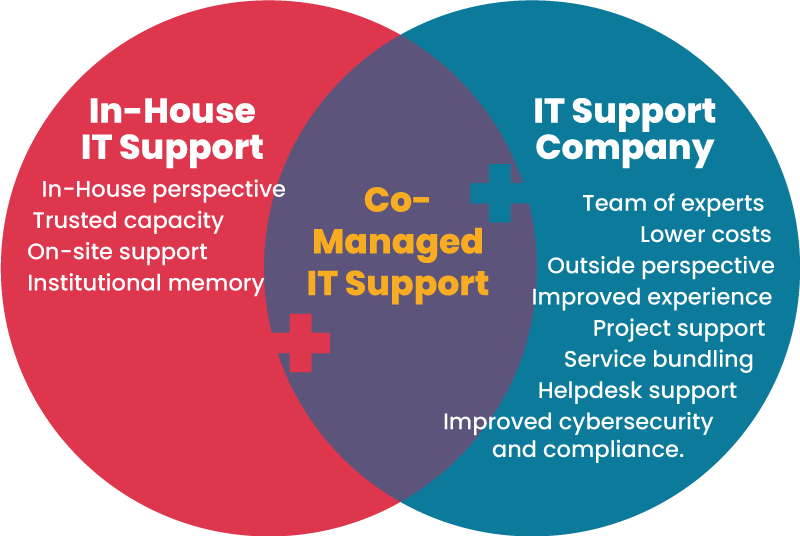Breaking Down the Benefits of Co-managed IT Support
by Jon Lober | NOC Technology
The best of both worlds.
Growth is as exciting as it is overwhelming for a small business—unless you are the IT person responsible for keeping up with all of that growth. Then it is just overwhelming.
As order numbers rise and the staff expands, so do the number of helpdesk tickets, outdated servers, and overwhelmed networks. Laptops proliferate and wander beyond the secure confines of the office onto public and home networks. A single capable IT person or small department might be able gracefully handle the occasional late-night upgrade, but large projects, sustained growth, or back-to-back crises can push even the most patient technician over the edge.
Even without significant business growth, many small IT departments are being overwhelmed by the rising tide of cybercrime plaguing the SMB sector. Since small businesses have a failure rate of 60% within 6 months of a data breach, the viability of most SMEs increasingly rests not only in the hands of executive leadership, but also the IT department. Expecting a do-it-all IT employee or understaffed IT department to implement a comprehensive cybersecurity strategy is like asking a family doctor to perform open heart surgery: maybe they pull it off, but neither the doctor nor the patient like their odds.
Once a management team recognizes the critical need for increased IT support, they face a difficult decision. They often do not want to outsource all of their IT support and lose the trustworthy team that has guided them this far. Inside knowledge, trust, and institutional memory have real value to most small businesses. On the other hand, they do not want to hire additional staff– since a single technician can easily represent another $70,000+ in annual expense.
Fortunately, there is a middle way in these situations. Co-managed it support with a managed service provider (MSP) can provide the best of both worlds: vastly increased expertise and capacity for lower cost than an additional employee.

Eight benefits of a co-managed IT arrangement.
Small businesses can outsource a wide variety of IT services through a co-management arrangement with an MSP. Some businesses may only need only occasional helpdesk support, while others prefer their IT service provider to manage most of their tech needs. Each contract can be tailored to the specific needs of an individual business.
If you think that co-management might be a good fit for your business, check out our
IT co-management guide for decision makers to learn about three criteria for a successful co-management arrangement and four indicators that it might be time to seek support.







